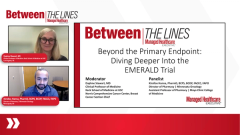
Implications of the EMERALD Study for Patients, Providers, and Payers
The EMERALD study carries significant implications across multiple stakeholders in ER+/HER2- metastatic breast cancer.
Episodes in this series

The EMERALD study carries significant implications across multiple stakeholders in ER+/HER2- metastatic breast cancer. For patients, the trial highlights a new oral SERD option that can overcome endocrine resistance, particularly in those with ESR1 mutations, potentially extending disease control while maintaining a manageable safety profile. Providers benefit from evidence supporting biomarker-driven treatment decisions, enabling more personalized therapy sequencing and informed discussions around efficacy, tolerability, and prior therapy exposure. For payers, the study underscores the importance of cost-effective resource allocation, as targeted therapies and genomic testing may increase upfront expenditures but can improve outcomes and potentially reduce downstream healthcare utilization associated with disease progression.
Newsletter
Get the latest industry news, event updates, and more from Managed healthcare Executive.






















